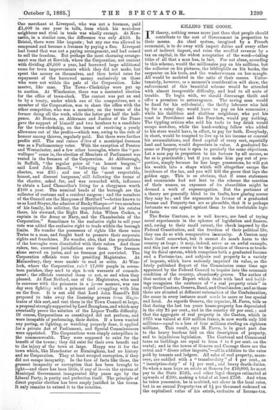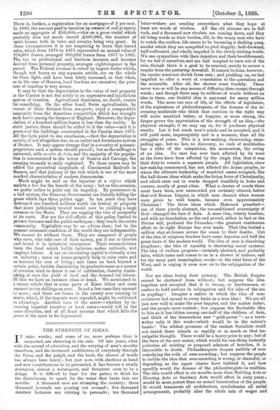KILLING THE GOOSE.
IN theory, nothing seems more just than that people should contribute to the cost of Government in proportion to their means. An ideal system, imagined by a French economist, is to do away with import duties and every other sort of indirect impost, and raise the needful revenue by a tax on capital, in the widest acceptation of the word—taking tithe of all that a man has, in fact. For not alone, according to this scheme, would the millionaire pay on his millions, but the collector on his pictures, the bibliophile on his books, the carpenter on his tools, and the washerwoman on her mangle. All would be mulcted in the ratio of their means. Unfor- tunately, however, as a moment's consideration will show, the enforcement of this beautiful scheme would be attended with almost insuperable difficulty, and lead to all sorts of trouble. To begin with, we should discourage thrift and offer a premium to extravagance. The saving man would be fined for his self-denial ; the thrifty labourer who laid by for a rainy day, would have to pay on his economies ; while his thriftless and shiftless neighbour, who put his trust in Providence aid the Poor-law, would pay nothing. The tippling artizan who sold his tools to buy drink would escape scot-free, while the hard-working fellow who added to his store would have, in effect, to pay for both. Everybody, in short, would be tempted to live up to his income or conceal his accumulations, and fixed capital of every sort, especially land and houses, would depreciate in value. A graduated In- come or Property-tax is open to precisely the same objections. Let a man pay in proportion to his fortune by all means, so far as is practicable ; but if you make him pay out of pro- portion, simply because he has large possessions, he will put his wealth into a shape which will altogether escape the incidence of the tax, and you will kill the goose that lays the golden eggs. This is so obvious, that if some statesmen and economists had not lent to the scheme the sanction of their names, an exposure of its absurdities might be deemed a work of supererogation. But the partisans of a theory are generally blind to its faults, how glaring soever they may be ; and the arguments in favour of a graduated Income and Property-tax are so plausible, that it is perhaps fortunate we can appeal against them to the irrefutable logic of facts.
• The Swiss 'Cantons, as is well known, are fond of trying novel experiments in the spheres of legislation and finance, and, owing to their small extent, the check imposed by the Federal Constitution, and the freedom of their political life, they can do so with comparative immunity. A Canton may hurt itself somewhat, but it cannot do much harm to the country at large ; it may, indeed, serve as an awful example, and this just now seems to be the position of Geneva as touch- ing its fiscal system, which comprises both a graduated Income and a Fortune-tax, and subjects real property to a variety of imposts, which have seriously impaired its value, as the lately published Report of the Commission some time ago appointed by the Federal Council to inquire into the economic condition of the country, abundantly proves. The author of that section of the Report which deals with land and build- ings recognises the existence of "a real property crisis" in only three Cantons, Geneva, Basel, and Graubiinden ; and as these three are situated at different extremities of the Confederation, the cause in every instance must needs be more or less special and local. As regards Geneva, the reporter, M. Fevre, tells us that during the last ten years house-property has depreciated in the city 25 per cent., and in the country 40 per cent. ; and that the aggregate of real property in the Canton, which in 1875 was valued at 450 million francs, is now worth only 350 millions—equal to a loss of four millions sterling on eighteen millions. This result, says M. Fevre, is in great part due to the heavy burdens laid on this description of property, and to injudicious legislation. The Cantonal and Communal taxes on buildings are equal to from 4 to 6 per cent, on the rental; and in the towns of Geneva and Carouge there are the octroi and "divers other imposts,"—all in addition to the rates paid by tenants and lodgers. All sales of real property, more- over, are saddled with a " transfer-duty " of 4 per cent., an " inscription-duty " of 11 per cent., and heavy death-duties. So when a man buys an estate at Geneva for £10,000, he must pay to the State £525, and other legal charges estimated at upwards of £200, making a total of at least £750. And when he takes possession, he is mulcted, not alone in the local rates, but in an annual Property-tax of 11 per thousand reckoned on the capitalised value of his estate, exclusive of Income-tax. There is, farther, a registration fee on mortgages of per cent. In 1883, the amount paid in taxation by owners of real property made an aggregate of £86,000,—this on a gross rental which probably does not much exceed £400,000, the number of nnlet houses both in town and country being very great. In these circumstances it is not surprising to learn that forced sales, which from 1870 to 1875 represented an annual value of 270,000 francs, averaged 800,000 francs from 1877 to 1883. The tax on professional and business incomes, and incomes derived from personal property, averages eighteenpence in the pound. The Federal revenue is raised by import duties which, though not heavy on any separate article, are on the whole far from light, and have been lately increased, so that when, as in the case of Geneva, local burdens are excessive, the pres- sure of taxation is very severe.
It may be that the depreciation in the value of real property in the Canton is not due solely to an oppressive and injudicious system of taxation. Agricultural depression, no doubt, counts for something. On the other hand, Swiss agriculturists, by reason of their distance from sea-ports, enjoy a comparative iroinunity from the American competition which has wrought each havoc among the farmers of England. Moreover, the depre- ciation of a hundred million francs is less than the reality. In strict justice, there should be added to it the value—and it is great—of the buildings constructed in the Canton since 1875. .611 the facts point to one conclusion,—that the depreciation is mainly, if not altogether due, to an unfair and doctrinaire system of finance. It may appear strange that in a country of peasant- proprietors such a system should prevail ; but as the suffrage is universal, with scrutin de liste, and the majority of the popula- tion is concentrated in the towns of Geneva and Carouge, the seeming anomaly is easily explained. To these causes may be added the proverbial ineptitude of Continental Radicals in finance and. that jealousy of the rich which is one of the most marked characteristics of modern democracies.
Much might be said on the injustice of a rigime which mnlcts a few for the benefit of the many ; but on this occasion, we prefer rather to point out its impolicy. By persistence in a bad system, the Genevan Government are literally killing the goose which lays them golden eggs. In ten years they have destroyed one hundred millions worth (in francs) of property that more judiciously treated would now be yielding a large revenue to the State. They are sapping the tree of prosperity at its roots. Nor are the evil effects of this policy limited to pri vate fortunes and the public exchequer ; they touch the entire community. Capitalists may be an odious class ; but in the present economic condition of the world they are indispensable. We cannot do without them. They are composed of people who save, who take care of their money, put it out to interest and invest it in industrial enterprises. Their accumulations form the fund which builds factories, makes railroads, and employs labour. A tax on circulating capital is virtually a tax on industry ; taxes on house-property help to raise rents and so increase the cost of living ; and taxes on land, beyond a certain point, besides diminishing its productiveness as a source of revenue, tend to throw it out of cultivation, thereby dimin- ishing at once the yield of food and the demand for labour. Of this we have an instance close at hand. We mentioned in a recent article that in some parts of Essex tithes and rates amount to ten shillings an acre. In not a few cases they amount to more ; and there are farms in the county now running to waste, which, if the imposts were repealed, might be cultivated to advantage. Another turn of the screw—whether by in- creasing imperial taxation or local rates—would tell in the same direction, and of all fiscal systems that which kills the goose is the most to be deprecated.















































 Previous page
Previous page